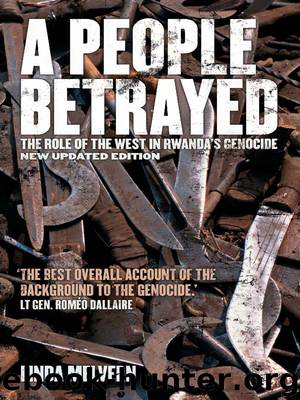A People Betrayed by Melvern Linda

Author:Melvern, Linda.
Language: eng
Format: epub
Publisher: National Book Network International
Published: 2014-02-17T16:00:00+00:00
15 | GENOCIDE SPREADS
§ Colonel Luc Marchal hung on at Kigali International Airport with the last of the Belgian peacekeepers for as long as he could. Three times he ignored final orders from General José Charlier, the commander of the Belgian army. Marchal wanted to give Dallaire enough time for the Ghanaian troops to move to Kigali from the DMZ, in spite of a shortage of vehicles, and dig in.
Marchal wrote a letter to the force commander, Lieutenant General Dallaire, to tell him that he was leaving under protest. The consequences of the Belgian withdrawal were clear to them all. Marchal wanted it on record that, in his estimation, the result would be a bloodbath. Thousands of people were going to be slaughtered. He was told to keep quiet but years later his anger was undiminished: ‘To dare to take this decision, and then to dare to try to persuade everyone else to adopt the same attitude, is inexplicable, inexcusable.’1 Only weeks before, Willy Claes, the Belgian foreign minister, had visited them and praised the UN peacekeepers, telling them how vital their work was in Rwanda. Claes said then he would back them to the hilt.
Marchal handed over his command on 19 April, at 9 a.m. At 11.30 a.m., with a final salute, he boarded a plane. Dallaire said: ‘I stood there as the last Hercules left … and I thought that almost exactly fifty years to the day my father and my father-in-law had been fighting in Belgium to free the country from fascism, and there I was, abandoned by Belgian soldiers. So profoundly did I despise them for it … I found it inexcusable.’
The Ghanaian battalion was redeployed to the airport and Canada kept a C-130 plane flying from Nairobi.2 Without this source of resupply the garrison would have collapsed completely. There were times when Dallaire ran out of everything, even food. At one point a Canadian Hercules was sent to Somalia, to Mogadishu, to fly in Canadian rations. It was able to land only when there was a lull in the fighting; on these occasions it would wait on the runway with engines running, for between five and ten minutes, as near as possible to the airport building, allowing those who were getting out to make a dash for it. Each time it landed, Dallaire was there. His determination and obstinacy helped to persuade the Canadian government that the mission must not be abandoned.3 It appears the pilots never received the recognition they deserved.
When the genocide began, Dallaire had been short of water and fuel. There had been no reserve stocks before 6 April, even though the issue had come up again and again in his daily reports to UN headquarters. There was no blood bank for the forces, no way of screening or storing blood and no essential drugs. Throughout the genocide, emergency electrical and communications facilities were kept operational by four UN civilian employees who had volunteered to stay behind with troops.4
Dallaire wondered whether the
Download
This site does not store any files on its server. We only index and link to content provided by other sites. Please contact the content providers to delete copyright contents if any and email us, we'll remove relevant links or contents immediately.
| Arms Control | Diplomacy |
| Security | Trades & Tariffs |
| Treaties | African |
| Asian | Australian & Oceanian |
| Canadian | Caribbean & Latin American |
| European | Middle Eastern |
| Russian & Former Soviet Union |
The Secret History by Donna Tartt(19088)
The Social Justice Warrior Handbook by Lisa De Pasquale(12190)
Thirteen Reasons Why by Jay Asher(8910)
This Is How You Lose Her by Junot Diaz(6887)
Weapons of Math Destruction by Cathy O'Neil(6280)
Zero to One by Peter Thiel(5802)
Beartown by Fredrik Backman(5754)
The Myth of the Strong Leader by Archie Brown(5507)
The Fire Next Time by James Baldwin(5446)
How Democracies Die by Steven Levitsky & Daniel Ziblatt(5219)
Promise Me, Dad by Joe Biden(5153)
Stone's Rules by Roger Stone(5088)
A Higher Loyalty: Truth, Lies, and Leadership by James Comey(4964)
100 Deadly Skills by Clint Emerson(4925)
Rise and Kill First by Ronen Bergman(4789)
Secrecy World by Jake Bernstein(4753)
The David Icke Guide to the Global Conspiracy (and how to end it) by David Icke(4720)
The Farm by Tom Rob Smith(4513)
The Doomsday Machine by Daniel Ellsberg(4490)
